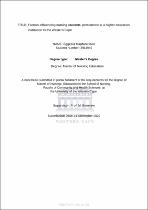| dc.contributor.advisor | Bimerew, Million | |
| dc.contributor.author | Mapfuranewe, Eggesta | |
| dc.date.accessioned | 2023-11-13T13:48:36Z | |
| dc.date.available | 2023-11-13T13:48:36Z | |
| dc.date.issued | 2023 | |
| dc.identifier.uri | http://hdl.handle.net/11394/10535 | |
| dc.description | Magister Curationis - MCur | en_US |
| dc.description.abstract | Background: Persistence of undergraduate nursing students at institutions of higher learning is mainly hampered by high attrition rates. High attrition rates are a global problem, attributed to a myriad of challenges that students experience during their years of study. This eventually leads to poor persistence which cascades down to a reduced number of nurses graduating and contributes to the global nursing shortage. Aim: The study aimed to investigate factors influencing the undergraduate nursing students’ persistence at a selected higher education institution in the Western Cape. Methodology: A quantitative method with a descriptive survey research design was employed to conduct the study. An all-inclusive sampling technique was used to include the study population of 317; 149 responses were obtained. Data was collected using both online and face-to-face self-administered questionnaires. Data was analysed using the Statistical Package for Social Sciences version 28. Results: The study showed that respondents were committed to obtaining their nursing degree and their commitment to the institution was robust. The respondents took their academic work seriously and were academically conscientious. The respondents were satisfied with their academic progress, although some had reservations about their relationship with the lecturers. Social coherence among the respondents, institution and campus community was lacking. The respondents did not find the institution convincingly supportive, and they did not have an overall sense of inclusion in the implementation of support services. Conclusion and recommendations: Students’ commitment to obtain their degrees and institutional commitment were the two most highly rated factors. Social engagement and campus support were the least rated factors. It is recommended that the institution should devise supportive academic programmes that make effective use of mentors for first-year students. The lecturers at the institution should attempt to make their presentations more interactive. The institution should also assist in setting up activities that encourage engagement and socialisation for students. | en_US |
| dc.language.iso | en | en_US |
| dc.publisher | University of the Western Cape | en_US |
| dc.subject | Academic Integration | en_US |
| dc.subject | Nursing | en_US |
| dc.subject | Higher education | en_US |
| dc.subject | University of the Western Cape | en_US |
| dc.subject | Persistence | en_US |
| dc.title | Factors influencing nursing students’ persistence at a higher education institution in the Western Cape | en_US |
| dc.rights.holder | University of the Western Cape | en_US |

